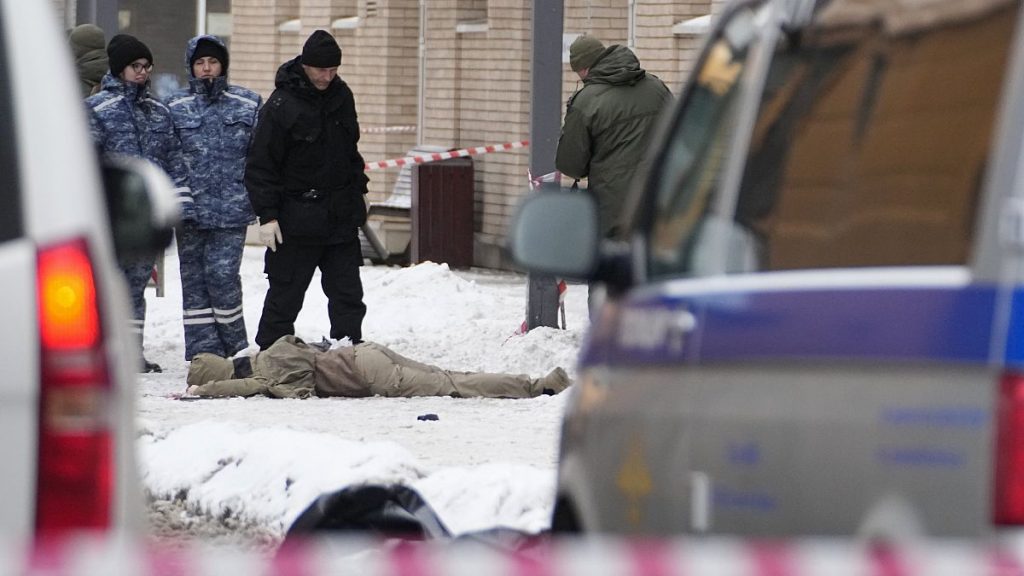Russia’s top security agency, the Federal Security Service (FSB), has announced the arrest of several suspects accused of involvement in an alleged Ukrainian plot to assassinate senior military officers. This announcement comes in the wake of the killing of Lieutenant General Igor Kirillov, who was killed on 17 December by a bomb hidden on an electric scooter outside his apartment building. The FSB stated that it had arrested four Russians accused of making preparations to kill senior Defence Ministry officials. The suspects were allegedly planning to use a remotely controlled car bomb to kill one of the officers and an explosive device hidden in an envelope to assassinate another official. The FSB released a video showing the arrest and interrogation of the suspects, who were not named in the statement.
The FSB has also arrested a suspect in connection with the bombing that killed Lieutenant General Kirillov, a citizen of Uzbekistan who claimed he had been recruited by Ukrainian special services. Kirillov, 54, was the chief of Russia’s Radiation, Biological and Chemical Protection Forces, responsible for protecting the military from nuclear, chemical, or biological weapons and operating in contaminated environments. The killing of Kirillov, which was claimed by Ukraine, has once again brought conflict to the streets of the Russian capital. Russian President Vladimir Putin described Kirillov’s death as a “major blunder” by Russia’s security agencies, highlighting the importance of improving their efficiency and learning from the incident.
The FSB did not disclose the names of the military officers who were targeted in the alleged plot, leaving many questions unanswered about the potential ramifications of the assassination attempts. The use of sophisticated methods such as a remotely controlled car bomb and an explosive device concealed in an envelope demonstrates the sinister nature of the alleged plot to eliminate senior military officials. The video released by the FSB showing the arrest and interrogation of the suspects underscores the gravity of the situation and the thoroughness of the investigation conducted by the security agency.
The arrest of suspects in connection with the alleged Ukrainian plot underscores the ongoing tensions between Russia and Ukraine, with accusations and counter-accusations fueling animosity between the two countries. The killing of a top Russian general and the subsequent arrests signal a dangerous escalation of hostilities and a potential shift towards more covert and violent tactics in the conflict. The death of Lieutenant General Kirillov has not only raised concerns about the safety of senior military officers but has also exposed vulnerabilities in Russia’s security apparatus.
The involvement of foreign agents, such as the Uzbek citizen recruited by Ukrainian special services, adds a layer of complexity to the situation and raises questions about the extent of external interference in Russia’s internal affairs. The fact that the FSB was able to apprehend suspects allegedly involved in the assassination plots showcases the agency’s determination to root out threats to national security. However, the lack of transparency regarding the identities of the suspects and the targeted military officers leaves room for speculation and uncertainty about the motives behind the attacks.
In conclusion, the assassination attempts on senior Russian military officers, including the killing of Lieutenant General Kirillov, represent a significant escalation of tensions between Russia and Ukraine. The arrests made by the FSB in connection with the alleged plots highlight the seriousness of the threat posed to national security and the importance of vigilance in thwarting such attempts. The ongoing conflict between Russia and Ukraine continues to pose a risk to stability in the region, with the use of sophisticated and covert methods adding a new dimension to the hostilities. The need for improved efficiency and coordination within Russia’s security agencies, as emphasized by President Putin, is paramount in addressing the evolving threats facing the country.















